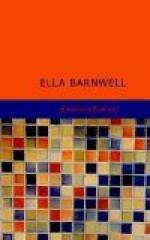“I have nothing to forgive; and had I, it should be forgiven,” answered Ella, sweetly, in a timid voice, her hands unconsciously toying with her needle-work, and her face half averted, whereon could be traced the suppressed workings of internal emotion.
“Thank you, Ella—thank you, for taking a weight from my heart. And now, ere I proceed with what to both of us will prove a painful revelation, let me make one request more—a foolish one I know—but one I trust you will grant nevertheless.”
“Name it,” said Ella, timidly, as the other paused.
“It is, simply, that in judging me by the evidence I shall give against myself, you will lean strongly to the side of mercy; and, when I am gone, think of me rather as an unfortunate than criminal being.”
“You alarm me, Mr. Reynolds, with such a request!” answered Ella, looking up to the other with a pale, anxious countenance. “I know not the meaning of it! and, as I said before, I would rather not have your secret in keeping—the more so, as you say the revelation will be a painful one to both.”
For a moment the young man paused, as though undecided as to his reply, while his countenance expressed a look of mortified regret really painful to behold—so much so, that Ella, moved by this to a feeling of compassion, said:
“I perceive my answer wounds your feelings—I meant no harm; go on with your story; I will listen, and endeavor to concede all you desire.”
“Thank you—again thank you!” returned the other, energetically, with emotion. “I will make my narrative brief as possible.”
Saying which, he entered the apartment where the other was sitting, and seating himself a few feet distant from her, after some little hesitation, as if to bring his resolution to the point, thus began:
“I shall pass over all minor affairs of my life, and come at once to the period and event, which changed me from a happy youth, blessed with home and friends, to a wanderer—I know not but an outlaw—on the face of the earth. I was born in the state of Connecticut, A.D. 1759; and my father being a man of property, and one determined on giving his children (of whom there were two, one older than myself) a liberal education, I was at an early age sent to a neighboring school, where I remained until turned of eighteen, and then returned to my parents.
“About this period, an old, eccentric lady—a maiden aunt of my father—died, bequeathing to me—or rather to the second born of her nephew, Albert Reynolds, which chanced to be myself—the bulk of her property—in value some fifty thousand dollars, on condition, that, between the ages of eighteen and twenty-two, I should marry a certain Elvira Longworth—a lady some three years my junior, for whom my great aunt had formed a strong attachment. And the will further provided, That in case the said second born of Albert Reynolds, either through the intervention of Providence, in removing




